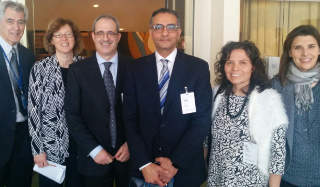NY: Six Experts of New Humanity at the General Assembly High-level Meeting About the Information Society

WSIS+10
UN’s General Assembly High-level Meeting
The UN’s General Assembly High-level Meeting on the overall review of the implementation of the outcomes of the World Summit on the Information Society in 2005 (WSIS+10) has been taken place at the UN Headquarters in New York ( 15-16 December 2015 ).
After its participation into the WSIS 2005 and the following events, New Humanity has been also present at this important event with an international delegation composed by six experts in this field.
Website of the WSIS+10 Event
New Humanity’s Comments on the Draft Outcome of 4th November 2015
World Summit on Information Society and the WSIS+10 review
In December 2003, in Geneva, the World Summit on the Information Society (WSIS) declared the “common desire and commitment to build a people-centered, inclusive and development-oriented Information Society”, and to recognize the power of information and communication technology (ICT) to contribute to the achievement of the Millennium Development Goals (MDGs). The resulting Geneva Plan of Action established targets and action lines. The second phase of WSIS was conducted in Tunis in 2005, with the resulting Tunis Commitment and Agenda1 addressing additional issues to address such as financing and internet governance. The Summit has adopted a multi-stakeholder approach, comprised of civil society (of which New Humanity is a part), the private sector, and governments and international organizations.
Following this approach, WSIS+10 encompasses an intergovernmental process that takes into account inputs from the relevant stakeholders of the World Summit on the Information Society. You can find on the following links: the Draft Outcome Document and the Comments delivered by New Humanity.
The New Humanity Vision
The New Humanity Non-Governmental Organization (NGO) has worked for over 10 years on capacity building projects in Sub Saharan Africa, Asia, and Latin America.
These projects confirm that the principles expressed at WSIS and reaffirmed in the WSIS+10 documents are not merely a hope. The ICTs provide key factors and “multi-level tools” for poverty reduction and socio-economic development.
Providing affordable, easy access to ICT infrastructure and services presents major challenges for the Information Society especially in rural and isolated regions.
The desire to “not be excluded” from participating in the global society through information technology has become a value that closely follows the need for food, water, security, property, and healthcare.
Assuring an adequate communication infrastructure enabling a two-way exchange of quality content can reduce risk factors, improve self-management in local communities, increase confidence in the future, and ease the migration phenomena.
The lessons learned through our experience demonstrates the value of cooperation among civil society, private institutions, and local governments towards social, economic, and environmental sustainability.
New Humanity encourages WSIS+10 to reaffirm strongly the need for multi-stakeholder cooperation at every level and to continue to promote concrete and verifiable dialogue through a participatory and transparent roadmap, nationally and especially locally.
New Humanity supports the request made by several commenters on the Draft Outcome Document to underline the desirability of an effective and continual inclusion of Civil Society. In particular, in the elaboration of national and international policies, Civil Society can play an important role by representing the real needs of the users and local community based on field experience. In addition, they can contribute to the creation of conditions that support Capacity Building initiatives and reduce the digital divide in a real and sustainable way.
In many situations, the full engagement of Civil Society in this process is an objective still to be reached.
As in the Draft Outcome Document, “we recognize that increased ICT connectivity, innovation, and access have played a critical role in enabling progress on the Millennium Development Goals, and we call for close alignment between the WSIS process and the 2030 Agenda for Sustainable Development“.
We would strongly emphasize as the General Assembly affirmed, in resolution 70/1 of 25 September 2015: “We are determined to foster peaceful, just and inclusive societies which are free from fear and violence. There can be no sustainable development without peace and no peace without sustainable development”.
New Humanity’s participation in the WSIS process
2005: participated at the WSIS in Tunis and its preparatory meetings;
2007: participated at the IGF in Rio De Janeiro
2008: participated in the IFG in Hyderabad in India
2009: participated in the IGF in Egypt
At IGF 2009, New Humanity organized the Workshop “Access to Satellite Communications as a Key for Capacity Building: a Reference Model Looking for Affordable Costs” in partnership with TNO, IICD, LATS, ACIM, ActNow Alliance.
2010: New Humanity participated in the UNDESA consultation on “Enhanced cooperation on international public policy issues pertaining to the Internet”.
2014: participated in the IFG in Istanbul
New Humanity has also edited the Italian and Portuguese unofficial translations of the four WSIS Concluding Documents (Traduzione italiana Documenti conclusivi del WSIS; Tradução portuguêsa-Documentos finais WSIS).


